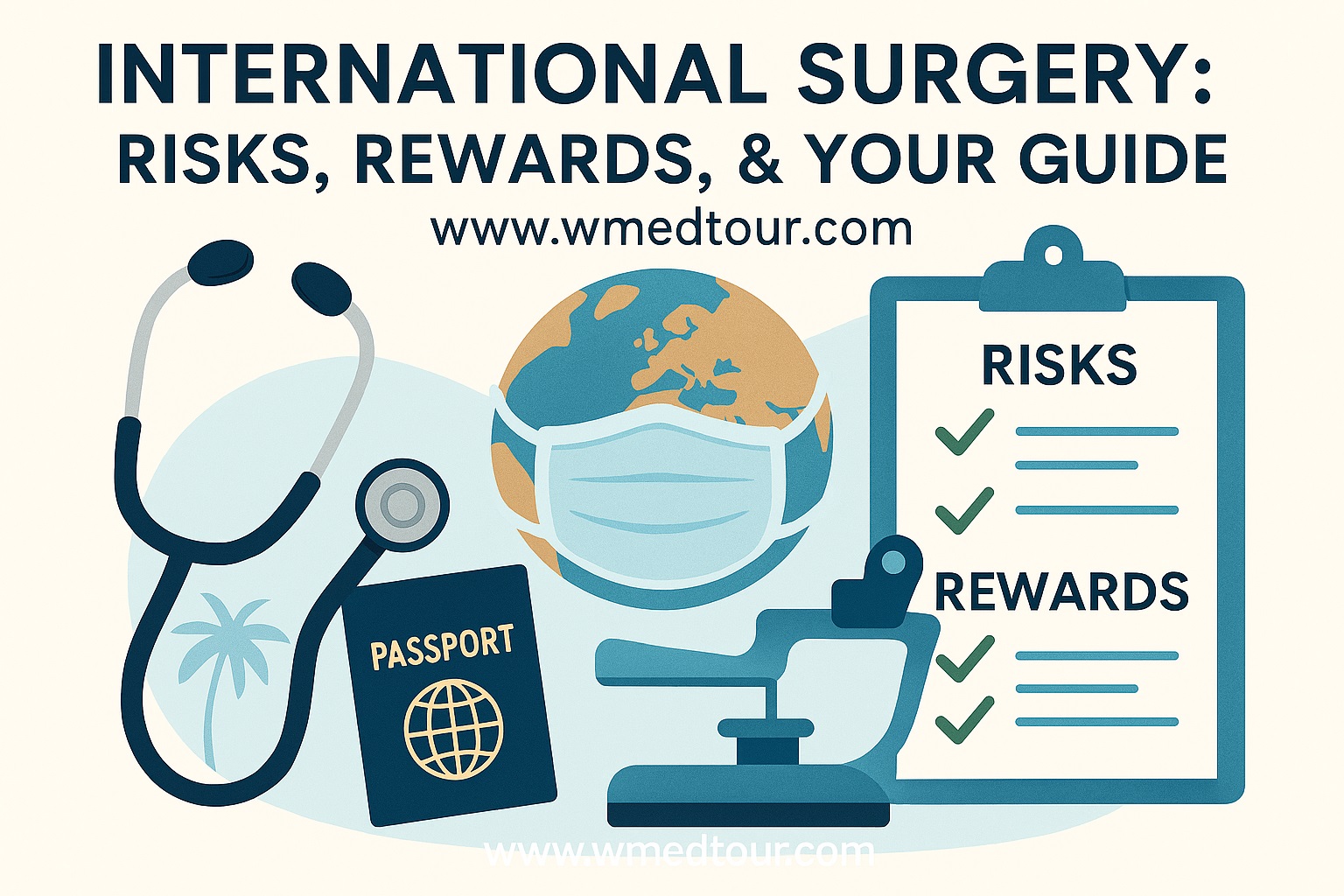International Surgery: Risks, Rewards, & Your Guide
The concept of medical tourism has grown exponentially in recent years, with millions of patients traveling abroad for medical procedures. This global movement is driven by the promise of affordable care, advanced treatments, and shorter waiting times. However, the journey to seek healthcare overseas involves a complex set of factors. It is essential to carefully consider the **international surgery risks and rewards** before making such a significant decision. This comprehensive guide will help you navigate this journey with confidence and clarity.
The Rewards: Why Patients Travel Abroad
Significant cost savings are the primary motivation for many patients. For instance, a major orthopedic surgery in the United States or Western Europe can cost tens of thousands of dollars more than the same procedure in countries like Iran or India. These savings don’t necessarily come at the expense of quality; on the contrary, many international hospitals are state-of-the-art and staffed by highly trained professionals.
Another benefit is access to faster care. In some national healthcare systems, for example, a non-emergency surgery might have a wait time of several months or even a year. Consequently, a patient needing urgent care might find a solution much faster abroad. Additionally, some countries specialize in specific procedures, offering access to leading experts and cutting-edge technology not always available at home. In fact, this specialized care is a major draw for individuals seeking cosmetic surgery, fertility treatments, or specific orthopedic procedures. Explore our plastic surgery department to learn more.
Financial Advantages
Beyond the obvious cost savings, many patients discover that international surgery packages often include expenses that would be separate at home. These comprehensive packages frequently cover the procedure, hospital stay, medications, and sometimes even accommodations for a companion.
The Risks: Navigating the Potential Dangers
While the rewards are compelling, it’s crucial to acknowledge the potential **risks of international surgery**. One significant concern is quality control. Although many facilities meet international standards, some may not. This lack of uniform regulation can unfortunately lead to complications. Furthermore, if something goes wrong, legal recourse can be incredibly challenging due to varying national laws.
Another major challenge is the lack of continuity of care. After returning home, managing post-operative care and follow-up appointments can be difficult without a local doctor familiar with your case. In addition, communication barriers can sometimes arise, even if the medical staff speaks your language, and subtle misunderstandings could have serious consequences. For more information on general travel health risks, consult the CDC’s travel health guidance.
Travel-Related Considerations
Traveling soon after surgery presents its own set of challenges. Long flights can increase the risk of blood clots, and changes in altitude and cabin pressure might affect healing incisions or implanted medical devices.
A Deeper Look at Quality and Safety
To begin, a successful medical tourism journey requires a thorough and meticulous vetting process. Simply put, you must do your homework. The first vital step involves verifying the credentials of the doctor and the accreditation of the hospital. Therefore, look for certifications from bodies like **Joint Commission International (JCI)** or the **International Society for Quality in Health Care (ISQua)**. Moreover, don’t just rely on a website’s claims. You should also seek out independent reviews and testimonials from past patients. In fact, a good medical tourism facilitator will provide you with access to this information and help you ask the right questions during a consultation. A great resource for general medical information is Johns Hopkins Medicine.
How to Vet a Hospital and Surgeon
Choosing the right hospital and surgeon abroad can seem like a daunting task, but a structured approach can simplify the process and minimize the **risks of international surgery**. Here’s a step-by-step guide to help you.
Step 1: Confirm Credentials and Accreditations
Start by checking the hospital’s accreditations and the surgeon’s board certifications. This is a crucial first step to confirm their professional legitimacy. In particular, look for well-known international bodies like JCI to ensure they meet global safety standards.
Step 2: Research the Surgeon’s Experience
Ask about the surgeon’s professional experience, including the number of times they have performed your specific procedure and their success rate. An experienced professional reduces the chances of complications. You’ll want to find a specialist with a proven track record.
Step 3: Evaluate Communication and Language
Ensure there is a clear communication plan in place. Verify that the medical staff and your assigned contact person are fluent in your language to avoid misunderstandings during critical moments. Communication is key to a smooth and safe experience.
Cost vs. Value: A Global Comparison
When it comes to medical tourism, the concept of value extends far beyond just the price tag. While countries like Turkey and India offer incredible affordability, others like Germany stand out for their long-standing reputation for medical excellence and research. On the other hand, a rising star in the medical tourism landscape is Iran. **In fact**, Iran offers an exceptional combination of high-quality, modern medical facilities, experienced surgeons, and significantly lower costs. Consequently, it presents a compelling option for those seeking a balance of excellence and affordability.
The table below provides a clear, side-by-side comparison of estimated costs and key advantages across several popular medical tourism destinations. This should help you in your search for a healthcare solution that meets both your medical and financial needs.
| Destination | Orthopedic Surgery (Estimated) | Cosmetic Procedures (Estimated) | Key Advantages |
|---|---|---|---|
| Iran | $3,000 – $8,000 | $1,500 – $5,000 | **Highly skilled surgeons**, advanced facilities, **exceptionally low costs**. |
| Turkey | $5,000 – $12,000 | $2,000 – $7,000 | **Renowned for hair transplants**, good infrastructure, well-established tourism sector. |
| India | $4,000 – $10,000 | $1,800 – $6,000 | **Cost-effective**, large pool of doctors, strong English communication. |
| Germany | $12,000 – $30,000 | $7,000 – $15,000 | **Long-standing reputation for excellence**, advanced research, high-tech care. |
Understanding the True Cost
When comparing prices, remember to factor in all potential expenses including travel, accommodation, and any unforeseen complications. Some destinations may appear more expensive initially but offer more comprehensive packages.
As you can see, the value proposition of each country varies, but Iran stands out as a top contender for quality care at a fraction of the cost. Find out more about our orthopedic surgery options.
The Patient Journey: Before, During, and After
Your medical journey is a multi-stage process that requires meticulous planning. In contrast to what some may think, it doesn’t end when you’re discharged from the hospital.
Before Your Trip: Preparation is Key
Before you even leave, you need to gather all your medical records, get a virtual consultation, and plan your travel logistics. It is also wise to have an emergency fund for any unexpected expenses that may arise during your stay. This type of detailed planning will help you minimize stress and focus on your health.
During Your Stay: Focus on Recovery
During your stay, you must focus on your recovery and maintain clear communication with the medical team. It’s often helpful, for example, to have a companion with you to assist with daily tasks.
After Surgery: The Recovery Process
After your surgery, the recovery process continues at home. This is where the initial planning becomes essential. You should have a clear understanding of the follow-up care, medications, and rehabilitation required. A good medical tourism facilitator will also help you coordinate with your local doctor, ensuring a smooth transition back to your regular life.
Important Consideration
The World Health Organization (WHO) also provides guidelines on the safety of international travel for medical reasons, which is worth reviewing before making your decision.
Making an Informed Decision
Ultimately, the decision to undergo international surgery is a deeply personal one. There are clear **rewards of international surgery**, such as significant cost savings and access to specialized care. These benefits, however, must be carefully weighed against the inherent **risks of international surgery**, including issues with quality control and aftercare. By following a structured vetting process, you can maximize your chances of a successful and safe experience. Learn more about our general surgery options.
Your journey to health is our priority. That’s why we at **WMEDTOUR** have dedicated ourselves to providing a transparent and comprehensive platform. We connect you with accredited hospitals and vetted specialists to ensure you make the best choice for your unique needs. We believe that everyone deserves access to high-quality, affordable healthcare, no matter where they live. Learn more about our mission.
Frequently Asked Questions about International Surgery and Medical Tourism




